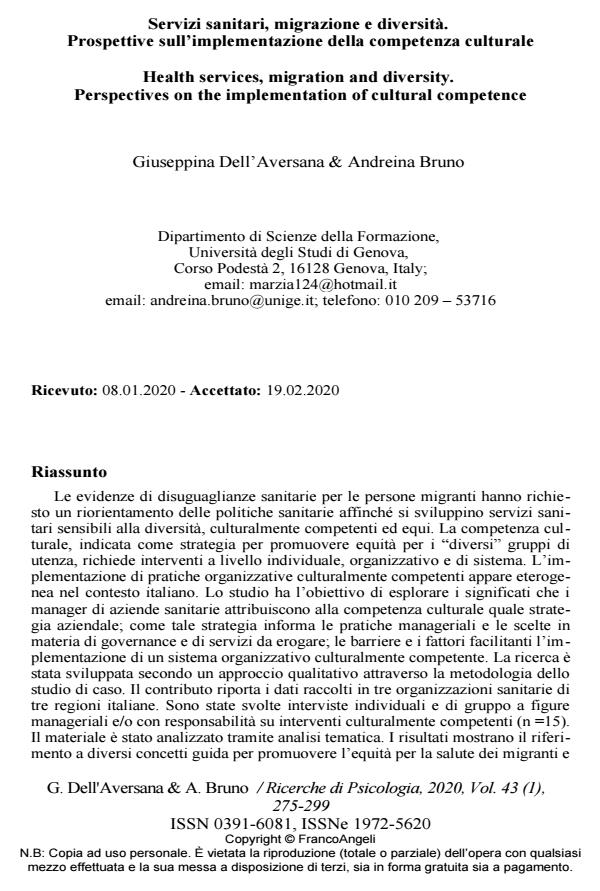Health services, migration and diversity. Perspectives on the implementation of cultural competence
Journal title RICERCHE DI PSICOLOGIA
Author/s Giuseppina Dell’Aversana, Andreina Bruno
Publishing Year 2020 Issue 2020/1
Language Italian Pages 25 P. 275-299 File size 263 KB
DOI 10.3280/RIP2020-001013
DOI is like a bar code for intellectual property: to have more infomation
click here
Below, you can see the article first page
If you want to buy this article in PDF format, you can do it, following the instructions to buy download credits

FrancoAngeli is member of Publishers International Linking Association, Inc (PILA), a not-for-profit association which run the CrossRef service enabling links to and from online scholarly content.
Evidence of inequities in migrants’ health has demanded for the reorientation of health policies to provide diversity responsive, cultural competent and equitable health services. Cultural competence, defined as a strategy to promote equity for “diverse” populations, requires interventions at individual, organizational and system levels. Organizational practices of cultural competence remain heterogeneously implemented in Italian health services. This study aims to explore managers’ perspectives on cultural competence in the healthcare system, considering how cultural competence is integrated in managerial practices and in service provision, and examining facilitators and barriers in the implementation of culturally competent interventions. We conducted a qualitative study based on the case study methodology. Data were collected in three health organizations of three Italian Regions. Individual and group interviews were conducted with managers or staff who had the lead responsibility for culturally competent programs (n = 15). Interviews were analysed through a thematic analysis. Findings show different concepts of cultural competence to promote equity for migrants’ health, and the role of contextual factors in affecting its organizational implementation. Data show the presence of practices to promote access and quality of care. However, further work is needed to embed cultural competence principles and practices at all levels of the organisation and promote participatory practices involving migrants and stakeholders.
Keywords: Cultural competence, health inequalities, migrants, barriers, manager, healthcare organizations.
- Migrazioni e psicologie. Introduzione al Forum Alessandro Antonietti, Antonella Marchetti, in RICERCHE DI PSICOLOGIA 1/2020 pp.13
DOI: 10.3280/RIP2020-001002
Giuseppina Dell’Aversana, Andreina Bruno, Servizi sanitari, migrazione e diversità. Prospettive sull’implementazione della competenza culturale in "RICERCHE DI PSICOLOGIA " 1/2020, pp 275-299, DOI: 10.3280/RIP2020-001013